#also another bad part is that my school doesnt let us choose the subjects we study you either pick the science stream or the commerce strea
Text
my school not even giving us the time to be burnt out is so funny like no joke i've literally got exams every three weeks give or take + summatives + notebook submissions + actually studying WITH NO LETUP WHATSOEVER we dont even have term break
#i have literally no time for Anything bc i've been so swamped with work I CANR EVEN READ!!!!!!!!!!! CAN U BELIEVE!!!!!!#also another bad part is that my school doesnt let us choose the subjects we study you either pick the science stream or the commerce strea#and stick with it til you die or graduate. whichever comes first#anyway there are 9 subjects in each stream which means 9 x 4 36 exams + 36 summatives in 4 1/2 months <3 what if i fucking killed myself#not to mention the minor subjects like pe music pnm etc that we ALSO have tests for every two months#and all of this bc some chindo kids who have literally already graduated failed ib i hope they fuckign DIE
1 note
·
View note
Text
Quill’s Swill - The Worst Of 2018
Congratulations dear reader. You survived 2018. And you know what that means. It’s time for another best of/worst of list. Welcome to Quill’s Swill 2018. A giant septic tank for the various shit the entertainment industry produced over the course of the year. The films, games, TV shows and various other media that got on my bad side. As always please bear in mind that this is only my subjective opinion (if you happen to like any of the things on this list, good for you. I’m glad someone did) and that obviously I haven’t seen everything 2018 has to offer for one reason or another. In other words, sorry that Fantastic Beasts: The Crimes Of Grindelwald isn’t on here. I’m sure it is as terrible as some have been suggesting. I just never got around to watching it.
Okay everyone. Grab your breathing masks and put on your rubber gloves. Let’s dive into this shit pile.
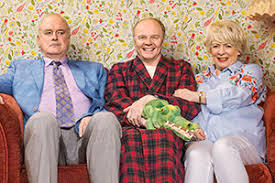
Hold The Sunset
The news that John Cleese would be returning to the world of BBC sitcoms was incredibly exciting, being a massive Fawlty Towers fan and all. Unfortunately Hold The Sunset was not quite what I had in mind. It’s one of those rare breed of situation comedies that chooses to offer no actual comedy. It’s not a sitcom. It’s a sit. Like Scrubs or The Big Bang Theory.
An elderly couple plan to elope abroad only for Alison Steadman’s son to barge in, having left his wife, and forcing them to put their plans on hold. Hence the title ‘Hold The Sunset.’ It’s like a cross between As Time Goes By and Sorry, but if all the humour and relatability were surgically removed by a deadpan mortician. The characters are weak, the plots are thin on the ground and the humour (hat little of it there is) feel incredibly dated. The middle aged mummy’s boy is something that hasn’t been funny since the 90s. It’s an utter waste of great talent and what hurts even more is that this tripe is actually getting a second series. I can only assume the people watching this are comatose. Either that or there’s an epidemic of people in Britain who have lost the remote.

Avengers: Infinity War
Yes this is one of the worst movies of 2018 and no I don’t regret saying that one little bit. Avengers: Infinity War was fucking terrible. Period. There were too many plots and characters going on, which made the film hard to follow (and what staggers me is that the so called ‘professional’ critics have condemned movies for having too many characters and plots before. Spider-Man 3, The Amazing Spider-Man 2, Batman vs Superman: Dawn Of Justice and even Deadpool 2. But because this is an MCU movie, it gets a free pass. Fuck off). The characterisation was weak due to sheer number of characters they try to juggle, resulting in characters coming off as one dimensional caricatures of themselves and scenes where characters such as Iron Man, Doctor Strange and Star-Lord sound completely interchangeable. The villain, Thanos, is a stupidly and poorly written villain, but that’s hardly surprising considering what a shit job Marvel have done building him up over the course of these 20+ movies. And let’s not forget that pisstake ending. A bunch of prominent Marvel characters die and it’s all very, very sad... except all these characters just so happen to have sequels planned, which makes this ending fucking pointless and have less impact than a feather on a bouncy castle.
I don’t know which is more shocking. That Marvel and Disney think their audience are that stupid and gullible, or that their audience are actually validating their view. Fuck you Disney.

Harry Potter: Hogwarts Mystery
I’ve always wanted a Harry Potter RPG, where you could customise your character, choose your house and actually live a full school life at Hogwarts. This year, Warner Bros and Jam City gave us just that.
That was a mistake.
Harry Potter: Hogwarts Mystery is the epitome of everything that’s wrong with the mobile gaming market right now. The gameplay is boring and involving where you just tap images on a screen until a progress bar fills up. Wizard duels are little more than rock-paper-scissors challenges that require no kind of skill. Bonding with friends and caring for magical creatures just consist of pathetically simple pop quizzes and yet more boring tapping. Oh and of course you only get a certain amount of energy to complete these tedious tasks. If you run out of energy, you wait for it to fill up... or pay up for the privilege. So determined are they to extract your hard earned cash from your wallet, there’s actually a bit where Devil’s Snare strangles your eleven year old avatar and the game effectively tries to guilt trip you into paying micro-transactions to save them. It’s sleazy, gross and manipulative. Honestly, you’re better off just playing Candy Crush.

Agony
When the developers of this game said they wanted to give the player a trip through Hell, they had no idea how true that statement really was. Agony is dreadful on a number of levels. The design for Hell itself, while visually interesting at times, is often not very practical and gets quite dull and repetitive after a while. The stealth mechanics are a joke and the AI of your demonic enemies are pitiful. All of this alone would have been enough to put this game on the list, but then we also have the casual misogyny. Agony is a gorefest trying desperately to shock the player. We see men and woman get tortured, but it’s the women that often get the extreme end. The violence inflicted on them is often sexual in nature and the game seems to go out of its way to degrade and dehumanise women at every turn. The orgasmic cries of ‘pull it out’ quickly become a staple of the game’s experience as we see naked women raped, tortured and murdered, all for the purposes of ‘entertainment.’
I would call Agony sexist, but honestly that would be giving it too much credit. Agony is like a little child trying desperately to be all dark and edgy in a pathetic attempt to impress everyone around him, and we should treat it as such. Go to your room Agony. No ice cream for you.

Peter Rabbit
If you listen closely, you can hear the sound of Beatrix Potter rotating in her grave.
Yes we have yet another live action/CGI hybrid, but instead of something innocuous like the Smurfs or Alvin and the Chipmunks, Sony instead decides to adapt Peter Rabbit, with James Corden in the title role.
It’s about as bad as you’d expect.
Their attempts to modernise the story are painful to say the least with pop culture references, inappropriate adult humour and twerking rabbits. Plus rather than the gentle, but slightly mischievous character we got in the source material, here Peter is a sociopathic delinquent who seems to revel in making the farmer’s life a living hell. He’s unlikable and unwatchable as far as I’m concerned and the film doesn’t in anyway earn the emotional moments it tries so desperately to sell to the audience. And the worst part is it’s getting a sequel.
Wait. Do you hear that sound? That’s the sound of Beatrix Potter tearing out of the ground, ready to kill whatever idiot came up with this shit.
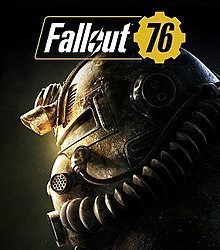
Fallout 76
I was excited for Fallout 76. A MMORPG where players band together to rebuild society after a nuclear apocalypse. Could have been great. Pity it wasn’t.
Fallout 76 is a dreadful game. Not only is it a buggy, glitchy mess that requires a constant online connection to play, which could result in you losing hours of progress if your WiFi went down, it’s also unbelievably tedious, and that’s because there’s nothing to do in the game. There’s no other characters to interact with, the various robots and computers you come across are really little more than quest givers, there’s no actual plot so to speak, and because of the sheer size of the world and the number of players allowed on a server, the chances of you actually meeting any actual players is remote. And let’s not forget all the behind the scenes drama. Bethesda falsely advertising Fallout themed canvas bags and players getting shitty nylon ones. Bethesda accidentally releasing the account information of various players trying to get a refund for said bag. Bethesda failing to program the year 2019 into the game code, meaning that the game’s nukes don’t work.
Maybe there’s a chance that Bethesda could pull a No Man’s Sky and fix everything over the coming years with various patches and DLCs, but the damage has already been done. It’s incredibly disappointing. The Elder Scrolls 6 is going to have be fucking incredible to win everyone back.
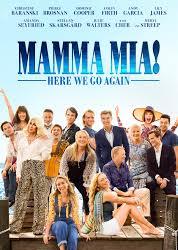
Mama Mia!: Here We Go Again
I can’t stand jukebox musicals anyway, but Mamma Mia was always one of the worst. Its boring, meandering story with its one note, obnoxious cast of characters screeching out ABBA songs like they’re at some drunken karaoke session at some poor sod’s hen party has always grated on my nerves. So imagine my delight when they announced we were getting a sequel. Ever wondered how Meryl Streep met her three lovers and founded her hotel? No? Well tough shit, we’re going to tell you anyway.
Mamma Mia: Here We Go Again is basically just Mamma Mia again. The actors still can’t sing, the characters are still annoying and story is still boring and meandering, completely at the mercy of the chosen songs rather than the filmmakers using the songs to compliment the story (you know? Like proper musicals do?).
How can I resist you? Very easily as it turns out. Gimme, gimme, gimme a fucking gun so I can end my misery.
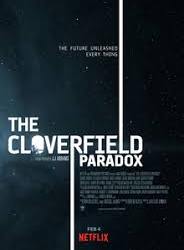
The Cloverfield Paradox
A lot of people were unhappy about the direction Cloverfield was going. They wanted a continuation of the found footage, kaiju movie from 2008, not an anthology series. I was personally all in favour. Partially because I thought the first Cloverfield was a tad overrated, but mostly because I thought it would be a great opportunity for more experimental film projects and could be a great launchpad for new writers and filmmakers. 10 Cloverfield Lane was a great start. Then The Cloverfield Paradox happened.
The Cloverfield Paradox is basically JJ Abrams trying to have his cake and eat it too. Maintaining the anthology format whilst connecting everything together in a ‘shared universe’ (yes, yet another shared universe). The result was a cliched, poorly edited and idiotic mess of a film that actually took away from the previous two films rather than added to them. Everyone hated it and, as a result, 2018′s Overlord, which was totes going to be part of the Cloververse, was made its own standalone film and Abrams double pinky promised to make a true sequel to the original Cloverfield. A complete and total disaster. No wonder it was a straight-to-Netflix film.
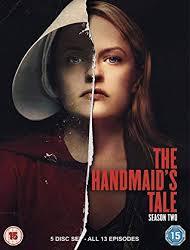
The Handmaid’s Tale - Season 2
This is probably going to be the most controversial entry on the list, but please hear me out because I’m not the only one who has a problem with this season.
I was reluctant to watch The Handmaid’s Tale simply because of how gruesome the original book was, but I forced myself to watch the first season and I thought it was pretty good. It remained faithful to the source material for the most part and included some nice additions that helped to expand the story and mythos. If it was just a one off mini-series, everything would have been fine. But then they made the same mistake as The Man In The High Castle and Under The Dome did where they commissioned another season and attempted to tell a story that goes beyond the book.
There’s a reason why the original story ended where it did. The Handmaid’s Tale isn’t meant to be an empowering story about women sticking it to the patriarchy. It’s a cautionary tale about how fragile our civil rights truly are and how easily they can be taken away from us. It’s designed to shock, not to satisfy. So seeing a handmaid blow herself up in a suicide bombing feels very incongruous and just a little bit silly. It would be like doing a TV adaptation of George Orwell’s 1984 where the first season followed the source material and then the second season turned Winston Smith into this heroic freedom fighter trying to overthrow Big Brother. It would represent a fundamental misunderstanding of what the book was about in the first place.
And then of course there’s the increased level of violence in Season 2, which many have complained about. In Season 1 and the original source material, the violence was justified. In Season 2, the motivation behind the violence has gone from ‘how can we effectively demonstrate how easily a fascist patriarchy can happen in the West?’ to ‘what brutal act can we inflict upon Ofglen to shock the audience this week?’ It’s purely for shock and nothing more. And with the showrunner (who I feel I should mention is a man) announcing that he has planned ten seasons of this, it seems that The Handmaid’s Tale is going to go even further with this depravity until it effectively becomes the equivalent of a Saw film.
The Handmaid’s Tale exists as a way of shining light on and critiquing misogyny in its most extreme form. Season 2 however demonstrates that there is a serious risk of it becoming the very thing it’s criticising in the first place.

The Predator
I love the Predator franchise, but The Predator is the worst.
People thought that this would be good because director Shane Black had actually starred in the first Predator movie back in 1987. Instead we got this bloated, confusing, obnoxious and insulting mess of a film that seems to go out of its way to ruin everything that makes Predator so good. There’s no tension. No suspense. No intrigue. Just a bunch of gore, explosions and shitty one liners from annoying and lifeless characters. They essentially took this big alien game hunter from outer space and turned him into a generic monster from a bad summer blockbuster. It no longer hunts for sport. It wants to take over the world and splice our DNA with theirs. But don’t worry, a rogue Predator doesn’t want to kill humans (even though he himself kills a bunch of humans), so he gives us a Predator Iron Man suit to set up a sequel that will probably never happen because this movie was a box office bomb and it fucking SUUUUUUUUUUUUCCCCCCKKKKKKKEEEEEDDDD!!!
This film also has a very nasty streak towards those with disabilities. There’s a lot of jokes at the expense of a character with Tourette’s and it has an extremely ignorant and patronising view of autism, portraying the main character’s kid as being a super genius who can decipher the Predator language and even going so far as to say that he represents ‘the next stage of human evolution.’ Presumably the Predators want social communication difficulties because apparently it helps them hunt somehow.
What with Disney acquiring 20th Century Fox, the future of both the Alien and Predator franchises were very much in question. This film needed to be a success in order to make a case for Disney to keep making more of them. It wasn’t. Congratulations Shane Black. You might have just killed off this franchise for good. Thanks arsehole! :D

So those were my least favourite stories from 2018. Join me on Wednesday where we shall discuss something more positive. Yes, it’s awards season. Who shall win the coveted Quill Seal Of Approval? Watch this space...
Or don’t. It’s up to you. I don’t want to force you or anything. It’s a free country.
18 notes
·
View notes
Text
How Journaling Practices Have Helped My Financial Situation
Ive mentioned often on The Simple Dollar how journaling is a daily practice for me and has been off and on (but mostly on) since middle school in various forms. At times, its taken the form of simply cataloguing my day; at other times, Ive written in response to various prompts; today, its completely different (and Ill write about that in a bit). In any case, writing in my journal simply put, getting thoughts out of my head down on paper is something that is a daily part of my life.
Why have I kept up with it for so long? How has it helped me in any way thats made it worth the time investment? And what does that practice look like? Thats what I want to share today.
Lets start with the why.
The Benefits of Journaling, Financial and Otherwise
I keep up with a daily journaling practice for a lot of reasons.
First of all, it feels like a mental relief to do it because it quiets the monologue in my head. Along with meditation, its one of the two most effective routine things Ive found in my life for getting the constantly chattering voice in my head to quiet down a little. That voice is constantly going over things I need to do, things Im thinking about or worried about, my upcoming plans, some problem Im interested in, and all kinds of other stray thoughts. That constant stream of thought is distracting. I find that dumping some of that stream of thought down on paper quiets that distracting voice pretty well, at least for a while. Ive found that one big burst of writing in my journal at the start of the day coupled with having a pocket notebook on me at all times to jot down other stray thoughts throughout the day keeps that voice a lot quieter and a lot less distracting.
Second, I use it to work through challenging problems in my life that Im not quite sure how to solve. When I observe something I dont like in my life, my mind often worries on that problem without ever really coming to a good conclusion on it. Ill think about that problem over and over, but at best my idle thoughts will come up with really half-baked solutions. When I sit down and journal and dump that problem out on paper, I find that I almost always work toward an actual good solution to the problem (or problems) in my head. By writing out the problem as I see it, I usually get some better insight into whats really going on, and then as I write down that insight, more pop up, and eventually I lead myself to the real source of the problem and perhaps a start down the path to a good solution.
This applies very well to personal finance. For example, it was writing in my journal that really helped me piece together that something was wrong with my financial life and gradually led me to the decision to make some major changes. It has helped me figure out what things in my life were frivolous expenses and which ones were not. It has helped me to identify situations where I was spending money nonsensically as an emotional response to some other situation in my life.
Third, its helped me to understand complex ideas by taking a bunch of swirling bits and pieces Ive learned recently and didnt fully understand and combine them into something meaningful and comprehensible and useful. Many of my journal entries have originated from my thinking about something I read recently or experienced recently that I didnt quite understand, and by simply spelling it all out piece by piece, the idea came together for me. I used to do this a lot when I was in college, but I still do it quite frequently when Im reading something or when Ive had a difficult interaction with someone.
For example, it was this practice that really helped me to understand investing and how index funds work and helped me decide that I should put as much of our investment money as possible into index funds. The ideas made sense on their own, but it was assembling the ideas and relating them to our own situation, which I did over a bunch of journaling sessions, that locked our retirement planning into place.
I did the same thing when we were shopping for a home. Many of my entries during the months in which we were house shopping were oriented around figuring out how the house buying process worked, how mortgages worked, and so on. This actually leads well into my next point.
Journaling has helped me come to a firm conclusion when there were a lot of options on the table. Often, decision making comes down to being able to filter through a lot of options, figure out which elements matter the most, and choose from those options based on that. Journaling has helped me with every piece of that process for many different major decisions in my life.
As I noted earlier, journaling was essential in our home buying process. I wrote down extensive thoughts on each home we visited, the relative merits and drawbacks of each, and what each would look like financially. My journaling process helped Sarah and I choose a home that we could afford that met our needs, a home we still live in.
Its helped me decide between investment options. Its helped me make career choices when I had several options on the table at a few points in my life. Simply writing through each of the options, figuring out what was good and bad about each one, and then coming to a clear decision not only helped me make a great decision at each of those crossroads, it also helped clear my head of constant worrying and constant thoughts on the subject.
So, how exactly do I do this? What does my journaling practice look like?
My Own Journaling Practice
Ive used a number of practices over the years, but the one Ive used for the last few years, with a few tweaks, has been a small variation on the three morning pages journaling practice first popularized by Julia Cameron.
In Camerons original practice, she simply suggested that a person sit down with a blank journal and start writing, filling up three pages in a journal with their writing before stopping for the day. Write about whatevers on your mind if its on your mind, just write it down, no matter how inane or pointless it seems. It gets that thought out of your head and makes space for whatevers next. Some days, everything is inane, and thats fine. Other days, youre working through some very difficult things, and thats fine, too. The goal is to empty that junk out of your head so you can get clean start to your day.
I tried doing this exact thing for a while, but I ran into a number of small problems with it. The biggest one was that my handwriting is small and the pages in my journal are big. I tend to journal by writing in block capital letters it just feels the most comfortable to me and the writing is pretty small. Most of my journals are either full size pages or close to it. Thus, it can take a long time to simply fill up a page with words, even if Im writing as fast as I can.
So, I modified the practice to what I call 45 morning minutes. I just set a timer for 45 minutes, sit down with my journal, open to the next blank page (or partial page), and start writing. When the timer goes off, I keep going until theres a clear break in thought and then I write a big double line across the page indicating the end of the day, and Im done. Journaling with a strict time limit keeps it within a reasonable time frame for me and makes it easy to schedule.
Obviously, I do this in the morning, usually before anyone else is awake. I find that doing this early in the day is really effective at quieting down that internal monologue that distracts me with chatter and ideas throughout the day. Id rather have it quiet in the mornings and afternoons so that I can get focused work done. So, thats another big part of the equation for me: journaling in the morning quiets my internal monologue so that I can focus better during the work day.
After I finish, I usually read back through my entry over the course of a few minutes, mostly to extract things that I need to get done in the near future. Are there any actionable items that I thought about or generated during that journaling? If so, I move them to my to-do list manager or to my calendar so I can find them later on in the day when Im actually doing stuff. Again, another key point: journaling often generates specific actions I need to work on or things I need to take care of, so I transfer those out to a to-do list.
After that, I just close my journal and go about my day.
There are a few obvious questions that come about from that description, so let me address them right now.
I read old entries, but nothing older than a few months. After four or five months, the old entries start to read like they were written by another person living another life. Its familiar in the way that a distant memory is familiar, but it doesnt feel like me any more. When journal entries reach that point, then there isnt really any value to them any more, at least not for me. The method of journaling I use is not really a record of what I did each day, so once the entries arent fresh, I dont find any personal value in them. Ive changed enough as a person that the situations and solutions I wrote about in old journals no longer apply specifically to new situations. I havent actively read journal entries more than a few months old in a long time, and every time I happen to see one, I really dont care to read it.
There are a few reasons for this, but most of it boils down to the fact that my journals reflect my active thinking at that moment, but when that moment fades away, theres not much value there. Its not a record of my life, but an outpouring of my current thought.
There are some specific reasons, too.
I am often deeply critical of myself, something that doesnt need to be re-read and dwelled upon. I sometimes tear myself to shreds when Im writing a journal entry. Im extremely critical of my flaws and mistakes, and while that can be good in the moment when Im assessing a situation or setting out a goal, it doesnt do me any good to read it later or for someone else to read it.
I am sometimes honestly critical of my children in a way that I wouldnt want them to read; I do this not to be cruel, but to figure out how to be a good parent to them. It does not make me a good parent to pretend that my children are perfect and flawless. Rather, one of the best things I can do as a parent is to honestly assess their good features and their flaws and take those into account when I figure out how to communicate well with them and guide them toward good decision making practices, life ambitions, and things of that nature. For example, I might write down that one of my children is extremely conscientious of others but is sometimes excessively boastful, or I might write that another child is richly thoughtful but very quick to frustration and anger. (Obviously, these arent actual observations and are quite sanitized to boot, just examples so you understand what I mean.) Those arent thoughts that I want them to read, or anyone else to read.
The same is true for my wife and my role as a husband and, occasionally, some of my friends and my role as their friend. I do similar evaluations of my wife at times. In what ways is she amazing? In what ways can I complement her with my strengths? In what ways does she complement my own weaknesses? How can I help out in areas where shes not as strong? Im sure shes glad that I think about such things and consider how to be a better husband, but I dont think even she would want to actually read such thoughts. The same thing is true if I assess a friend, particularly if theyre asking me for some life advice. I want to give the best advice I can to them, and that sometimes means being critical, and sometimes those words find their way into my journals.
Thus, I dont save old journals, at least not anything older than my most recent one. I keep my current journal and my previous one in a secure place where they cant easily be found. My current journal is easy for me to grab in the mornings, but its not in a place where it would likely be found. When my current journal is full, I destroy the previous journal after I read through it again.
For a while, I was keeping digital copies of my old journals, but I found that I was never looking at them, didnt really want to ever look at them, and didnt want anyone else to find them, so I stopped doing this. The downside to others finding those thoughts was worth more than the upside of any potential limited use I might have for them in the future.
The policy of destroying the journals and keeping the current one secure lets me be more unguarded with my journaling. Given that I know my journals wont be around for posterity, I feel more comfortable just letting my thoughts fly on the page. I dont worry about who might read them or how they might appear for posterity. At worst, the most recent journal or two might be found, and that doesnt worry me too much. I usually start off each journal with a note saying that this is a collection of my unguarded thoughts as I worked through personal decisions and I would appreciate that the journal would be destroyed upon discovery if I were to pass.
I vastly prefer handwritten journaling, but I may switch to using a stylus and writing on a table in the future as those technologies improve; writing by hand provides a clarity of thought that typing doesnt quite provide for me. For me, typing is conducive to rapidly recording ideas, but the process doesnt allow me any space to think about them. If I want to explore my thoughts, consider things, and actually remember them, I write things out by hand. This is true for journaling, but its also true for taking notes at meetings, taking notes when Im reading, taking notes during a lecture, and so on. I write all of those notes by hand and, if theres potential value that I might get out of them later, I convert them to digital format.
I feel like taking notes with an Apple Pencil on an iPad is 90% of the way to where I want a stylus to be, but its not all the way there yet. When its perfect, writing thoughts down on a tablet using a stylus will be the best way to journal and take notes because it offers the advantages of both writing by hand and digital notes, but for now, its not quite there yet, and given a choice between the two, the thoughtfulness and retention of writing by hand outweighs typing out journal entries for me.
I use Leuchtturm 1917 journals and either Uniball Signo 207, Pilot G2, or Pilot Juice pens. The journal isnt a requirement Ive used all kinds of different things over the years but I really like the size and the binding and paper quality of that specific journal. One of those usually lasts about two and a half months for my journaling purposes. As for the pens, I really only have three requirements for a pen: it needs to write when I want it without a lot of futzing around, it needs to have a thin line and not bleed all over the page or make a mess, and it needs to not leak in my pocket. The pens listed up there pass those tests with flying colors. I can get weeks and weeks out of writing with just one of them and it costs less than a dollar, which is good enough for me. Id rather spend $0.75 on a pen that will write for weeks without fail and not make a mess or leak than a $0.25 pen or a freebie that will need a bunch of waving around or tinkering when I want it to write, leave a ton of messy ink on the page, and inevitably leave a big blotch of ink on the paper or in my pocket.
Final Thoughts
Spending some time each day journaling simply writing my thoughts down on paper not only helps me piece through the problems in my life and ideas in my head, it also helps clear my mind and make it easier to focus on the tasks of the day because it quiets the voice in my head that would otherwise keep running through those problems and ideas. It has helped me not only figure out a bunch of financial and professional problems, its also helped keep my mind focused when actually doing work to earn an income.
I find that my 45 morning minutes practice works extremely well for me, but there are many practices out there that range from simply listing the events of the day, writing what youre grateful for, brainstorming, and many other things. I highly recommend trying several practices until you find one that works well for you and then stick with it for a while. You might just find that it becomes an essential part of your life toolbox.
Good luck!
https://www.thesimpledollar.com/how-journaling-practices-have-helped-my-financial-situation/
0 notes
Text
How Journaling Practices Have Helped My Financial Situation
Ive mentioned often on The Simple Dollar how journaling is a daily practice for me and has been off and on (but mostly on) since middle school in various forms. At times, its taken the form of simply cataloguing my day; at other times, Ive written in response to various prompts; today, its completely different (and Ill write about that in a bit). In any case, writing in my journal simply put, getting thoughts out of my head down on paper is something that is a daily part of my life.
Why have I kept up with it for so long? How has it helped me in any way thats made it worth the time investment? And what does that practice look like? Thats what I want to share today.
Lets start with the why.
The Benefits of Journaling, Financial and Otherwise
I keep up with a daily journaling practice for a lot of reasons.
First of all, it feels like a mental relief to do it because it quiets the monologue in my head. Along with meditation, its one of the two most effective routine things Ive found in my life for getting the constantly chattering voice in my head to quiet down a little. That voice is constantly going over things I need to do, things Im thinking about or worried about, my upcoming plans, some problem Im interested in, and all kinds of other stray thoughts. That constant stream of thought is distracting. I find that dumping some of that stream of thought down on paper quiets that distracting voice pretty well, at least for a while. Ive found that one big burst of writing in my journal at the start of the day coupled with having a pocket notebook on me at all times to jot down other stray thoughts throughout the day keeps that voice a lot quieter and a lot less distracting.
Second, I use it to work through challenging problems in my life that Im not quite sure how to solve. When I observe something I dont like in my life, my mind often worries on that problem without ever really coming to a good conclusion on it. Ill think about that problem over and over, but at best my idle thoughts will come up with really half-baked solutions. When I sit down and journal and dump that problem out on paper, I find that I almost always work toward an actual good solution to the problem (or problems) in my head. By writing out the problem as I see it, I usually get some better insight into whats really going on, and then as I write down that insight, more pop up, and eventually I lead myself to the real source of the problem and perhaps a start down the path to a good solution.
This applies very well to personal finance. For example, it was writing in my journal that really helped me piece together that something was wrong with my financial life and gradually led me to the decision to make some major changes. It has helped me figure out what things in my life were frivolous expenses and which ones were not. It has helped me to identify situations where I was spending money nonsensically as an emotional response to some other situation in my life.
Third, its helped me to understand complex ideas by taking a bunch of swirling bits and pieces Ive learned recently and didnt fully understand and combine them into something meaningful and comprehensible and useful. Many of my journal entries have originated from my thinking about something I read recently or experienced recently that I didnt quite understand, and by simply spelling it all out piece by piece, the idea came together for me. I used to do this a lot when I was in college, but I still do it quite frequently when Im reading something or when Ive had a difficult interaction with someone.
For example, it was this practice that really helped me to understand investing and how index funds work and helped me decide that I should put as much of our investment money as possible into index funds. The ideas made sense on their own, but it was assembling the ideas and relating them to our own situation, which I did over a bunch of journaling sessions, that locked our retirement planning into place.
I did the same thing when we were shopping for a home. Many of my entries during the months in which we were house shopping were oriented around figuring out how the house buying process worked, how mortgages worked, and so on. This actually leads well into my next point.
Journaling has helped me come to a firm conclusion when there were a lot of options on the table. Often, decision making comes down to being able to filter through a lot of options, figure out which elements matter the most, and choose from those options based on that. Journaling has helped me with every piece of that process for many different major decisions in my life.
As I noted earlier, journaling was essential in our home buying process. I wrote down extensive thoughts on each home we visited, the relative merits and drawbacks of each, and what each would look like financially. My journaling process helped Sarah and I choose a home that we could afford that met our needs, a home we still live in.
Its helped me decide between investment options. Its helped me make career choices when I had several options on the table at a few points in my life. Simply writing through each of the options, figuring out what was good and bad about each one, and then coming to a clear decision not only helped me make a great decision at each of those crossroads, it also helped clear my head of constant worrying and constant thoughts on the subject.
So, how exactly do I do this? What does my journaling practice look like?
My Own Journaling Practice
Ive used a number of practices over the years, but the one Ive used for the last few years, with a few tweaks, has been a small variation on the three morning pages journaling practice first popularized by Julia Cameron.
In Camerons original practice, she simply suggested that a person sit down with a blank journal and start writing, filling up three pages in a journal with their writing before stopping for the day. Write about whatevers on your mind if its on your mind, just write it down, no matter how inane or pointless it seems. It gets that thought out of your head and makes space for whatevers next. Some days, everything is inane, and thats fine. Other days, youre working through some very difficult things, and thats fine, too. The goal is to empty that junk out of your head so you can get clean start to your day.
I tried doing this exact thing for a while, but I ran into a number of small problems with it. The biggest one was that my handwriting is small and the pages in my journal are big. I tend to journal by writing in block capital letters it just feels the most comfortable to me and the writing is pretty small. Most of my journals are either full size pages or close to it. Thus, it can take a long time to simply fill up a page with words, even if Im writing as fast as I can.
So, I modified the practice to what I call 45 morning minutes. I just set a timer for 45 minutes, sit down with my journal, open to the next blank page (or partial page), and start writing. When the timer goes off, I keep going until theres a clear break in thought and then I write a big double line across the page indicating the end of the day, and Im done. Journaling with a strict time limit keeps it within a reasonable time frame for me and makes it easy to schedule.
Obviously, I do this in the morning, usually before anyone else is awake. I find that doing this early in the day is really effective at quieting down that internal monologue that distracts me with chatter and ideas throughout the day. Id rather have it quiet in the mornings and afternoons so that I can get focused work done. So, thats another big part of the equation for me: journaling in the morning quiets my internal monologue so that I can focus better during the work day.
After I finish, I usually read back through my entry over the course of a few minutes, mostly to extract things that I need to get done in the near future. Are there any actionable items that I thought about or generated during that journaling? If so, I move them to my to-do list manager or to my calendar so I can find them later on in the day when Im actually doing stuff. Again, another key point: journaling often generates specific actions I need to work on or things I need to take care of, so I transfer those out to a to-do list.
After that, I just close my journal and go about my day.
There are a few obvious questions that come about from that description, so let me address them right now.
I read old entries, but nothing older than a few months. After four or five months, the old entries start to read like they were written by another person living another life. Its familiar in the way that a distant memory is familiar, but it doesnt feel like me any more. When journal entries reach that point, then there isnt really any value to them any more, at least not for me. The method of journaling I use is not really a record of what I did each day, so once the entries arent fresh, I dont find any personal value in them. Ive changed enough as a person that the situations and solutions I wrote about in old journals no longer apply specifically to new situations. I havent actively read journal entries more than a few months old in a long time, and every time I happen to see one, I really dont care to read it.
There are a few reasons for this, but most of it boils down to the fact that my journals reflect my active thinking at that moment, but when that moment fades away, theres not much value there. Its not a record of my life, but an outpouring of my current thought.
There are some specific reasons, too.
I am often deeply critical of myself, something that doesnt need to be re-read and dwelled upon. I sometimes tear myself to shreds when Im writing a journal entry. Im extremely critical of my flaws and mistakes, and while that can be good in the moment when Im assessing a situation or setting out a goal, it doesnt do me any good to read it later or for someone else to read it.
I am sometimes honestly critical of my children in a way that I wouldnt want them to read; I do this not to be cruel, but to figure out how to be a good parent to them. It does not make me a good parent to pretend that my children are perfect and flawless. Rather, one of the best things I can do as a parent is to honestly assess their good features and their flaws and take those into account when I figure out how to communicate well with them and guide them toward good decision making practices, life ambitions, and things of that nature. For example, I might write down that one of my children is extremely conscientious of others but is sometimes excessively boastful, or I might write that another child is richly thoughtful but very quick to frustration and anger. (Obviously, these arent actual observations and are quite sanitized to boot, just examples so you understand what I mean.) Those arent thoughts that I want them to read, or anyone else to read.
The same is true for my wife and my role as a husband and, occasionally, some of my friends and my role as their friend. I do similar evaluations of my wife at times. In what ways is she amazing? In what ways can I complement her with my strengths? In what ways does she complement my own weaknesses? How can I help out in areas where shes not as strong? Im sure shes glad that I think about such things and consider how to be a better husband, but I dont think even she would want to actually read such thoughts. The same thing is true if I assess a friend, particularly if theyre asking me for some life advice. I want to give the best advice I can to them, and that sometimes means being critical, and sometimes those words find their way into my journals.
Thus, I dont save old journals, at least not anything older than my most recent one. I keep my current journal and my previous one in a secure place where they cant easily be found. My current journal is easy for me to grab in the mornings, but its not in a place where it would likely be found. When my current journal is full, I destroy the previous journal after I read through it again.
For a while, I was keeping digital copies of my old journals, but I found that I was never looking at them, didnt really want to ever look at them, and didnt want anyone else to find them, so I stopped doing this. The downside to others finding those thoughts was worth more than the upside of any potential limited use I might have for them in the future.
The policy of destroying the journals and keeping the current one secure lets me be more unguarded with my journaling. Given that I know my journals wont be around for posterity, I feel more comfortable just letting my thoughts fly on the page. I dont worry about who might read them or how they might appear for posterity. At worst, the most recent journal or two might be found, and that doesnt worry me too much. I usually start off each journal with a note saying that this is a collection of my unguarded thoughts as I worked through personal decisions and I would appreciate that the journal would be destroyed upon discovery if I were to pass.
I vastly prefer handwritten journaling, but I may switch to using a stylus and writing on a table in the future as those technologies improve; writing by hand provides a clarity of thought that typing doesnt quite provide for me. For me, typing is conducive to rapidly recording ideas, but the process doesnt allow me any space to think about them. If I want to explore my thoughts, consider things, and actually remember them, I write things out by hand. This is true for journaling, but its also true for taking notes at meetings, taking notes when Im reading, taking notes during a lecture, and so on. I write all of those notes by hand and, if theres potential value that I might get out of them later, I convert them to digital format.
I feel like taking notes with an Apple Pencil on an iPad is 90% of the way to where I want a stylus to be, but its not all the way there yet. When its perfect, writing thoughts down on a tablet using a stylus will be the best way to journal and take notes because it offers the advantages of both writing by hand and digital notes, but for now, its not quite there yet, and given a choice between the two, the thoughtfulness and retention of writing by hand outweighs typing out journal entries for me.
I use Leuchtturm 1917 journals and either Uniball Signo 207, Pilot G2, or Pilot Juice pens. The journal isnt a requirement Ive used all kinds of different things over the years but I really like the size and the binding and paper quality of that specific journal. One of those usually lasts about two and a half months for my journaling purposes. As for the pens, I really only have three requirements for a pen: it needs to write when I want it without a lot of futzing around, it needs to have a thin line and not bleed all over the page or make a mess, and it needs to not leak in my pocket. The pens listed up there pass those tests with flying colors. I can get weeks and weeks out of writing with just one of them and it costs less than a dollar, which is good enough for me. Id rather spend $0.75 on a pen that will write for weeks without fail and not make a mess or leak than a $0.25 pen or a freebie that will need a bunch of waving around or tinkering when I want it to write, leave a ton of messy ink on the page, and inevitably leave a big blotch of ink on the paper or in my pocket.
Final Thoughts
Spending some time each day journaling simply writing my thoughts down on paper not only helps me piece through the problems in my life and ideas in my head, it also helps clear my mind and make it easier to focus on the tasks of the day because it quiets the voice in my head that would otherwise keep running through those problems and ideas. It has helped me not only figure out a bunch of financial and professional problems, its also helped keep my mind focused when actually doing work to earn an income.
I find that my 45 morning minutes practice works extremely well for me, but there are many practices out there that range from simply listing the events of the day, writing what youre grateful for, brainstorming, and many other things. I highly recommend trying several practices until you find one that works well for you and then stick with it for a while. You might just find that it becomes an essential part of your life toolbox.
Good luck!
https://www.thesimpledollar.com/how-journaling-practices-have-helped-my-financial-situation/
0 notes